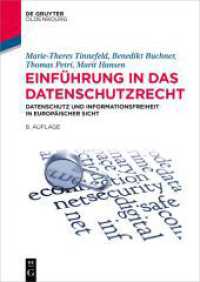- ホーム
- > 洋書
- > ドイツ書
- > Social Sciences, Jurisprudence & Economy
- > Politics, Society, Work
- > political science
Description
(Short description)
Many countries in Asia are inhabited by multi-segment societies diversified in terms of race, religion, language and economic status. They have repeatedly provided the basis for analysis of the search for consensus in the construction of a political scene that would ensure the participation in power of each group. Regardless of the chosen model, the distribution of power in multi-segment societies has always been characterized by a state of "unstable equilibrium". Practical solutions constantly evolved between consociationalism, centripetalism, federalism. In extreme cases they led to political disintegration of states or to permanent domination of one of the segments, most often based on authoritarian solutions. An Analysis of the Current Situation of Power-sharing in Selected Asian Countries
(Text)
Many countries in Asia are inhabited by multi-segment societies diversified in terms of race, religion, language and economic status. They have repeatedly provided the basis for analysis of the search for consensus in the construction of a political scene that would ensure the participation in power of each group. Regardless of the chosen model, the distribution of power in multi-segment societies has always been characterized by a state of "unstable equilibrium". Practical solutions constantly evolved between consociationalism, centripetalism, federalism. In extreme cases they led to political disintegration of states or to permanent domination of one of the segments, most often based on authoritarian solutions. In this volume, a group of scholars specializing in countries of the region try to point out the dynamics of the "unstable equilibrium" of power sharing in particular Asian countries and analyze the trends occurring in them in the 21st century.
(Author portrait)
Krzysztof Trzcinski, Ph.D., is a professor of political science and international studies at the Jagiellonian University in Kraków, Poland. He is a lecturer in the politics and societies of Indonesia and Sub-Saharan Africa and an author and editor of over 90 academic publications on institutional design for conflict management in multi-ethnic and multi-religious societies, political thought, citizenship theory, separatism, and conceptual analysis. He regularly visits African and Asian countries, where he conducts field research projects, including discussions with academics and public officials.Prof. Dr. Adam W. Jelonek is director of the Institute of the Middle and Far East at the Jagiellonian University in Krakow, Poland. He finished MBA at the University of Illinois at Urbana Champaign. Between 2007 and 2009, he was Chairman of the Scientific Council of the Institute of Regional Studies at the Jagiellonian University. Between 2010 and 2014 he was an Ambassador Extraordinary and Plenipotentiary of the Republic of Poland to Malaysia, Brunei and the Philippines. Adam Jelonek specializes in: diplomatic protocol, history of Southeast Asia, political systems of East Asia, revolution of Khmer Rouges, multi-ethnic society of Malaysia, cross-cultural management.Prof. Dr. Adam W. Jelonek is director of the Institute of the Middle and Far East at the Jagiellonian University in Krakow, Poland. He finished MBA at the University of Illinois at Urbana Champaign. Between 2007 and 2009, he was Chairman of the Scientific Council of the Institute of Regional Studies at the Jagiellonian University. Between 2010 and 2014 he was an Ambassador Extraordinary and Plenipotentiary of the Republic of Poland to Malaysia, Brunei and the Philippines. Adam Jelonek specializes in: diplomatic protocol, history of Southeast Asia, political systems of East Asia, revolution of Khmer Rouges, multi-ethnic society of Malaysia, cross-cultural management.








